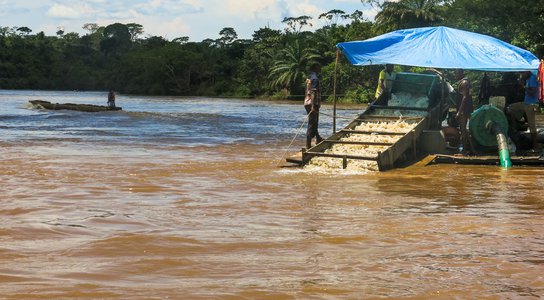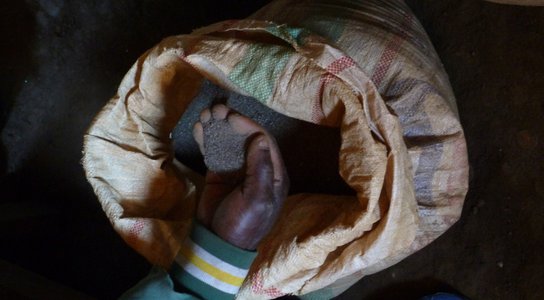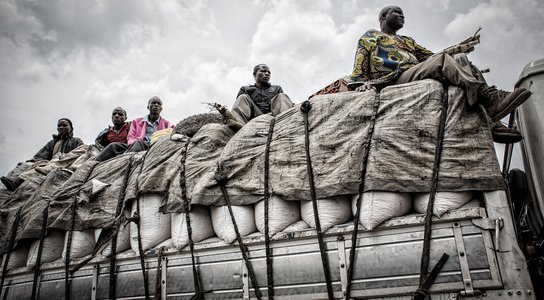The trade in natural resources finances conflict and human rights abuses all over the world. For decades the trade in minerals, precious stones, and other commodities has played a central role in fuelling some of the world’s most brutal conflicts and weakening already fragile states. Global Witness has exposed links between abuses, fighting, and this trade in the Central African Republic, Myanmar, Afghanistan, the Democratic Republic of Congo, and elsewhere.
We have seen how revenues from the trade in natural resources can give abusive armed groups the means and incentive to operate and funding to State security forces and corrupt officials hiding behind secretive company structures. Armed groups and security forces that control mines or transportation routes can generate millions of dollars in cash—money that should be used to benefit the local population.
Over the last 15 years, Global Witness has investigated the links between the lucrative trade in tin, tantalum, tungsten and gold and armed conflict in eastern Congo. This conflict has involved several countries in central Africa, and the war and its aftermath have led to the deaths of millions. The conflict in Congo is complex and is underpinned by a web of long-standing political tensions, ethnic grievances and disputes over land. But it is also fuelled and funded, at least in part, by mineral resources.
In 2016, for example, a gold rush in Shabunda territory in eastern Congo yielded an estimated US$38 million in gold per year. We revealed how some of this gold directly benefitted predatory armed group—including Raia Mutomboki—at the expense of impoverished artisanal mining communities.
After Congo’s valuable minerals are mined, they enter global supply chains. From here they are processed and manufactured into a wide variety of consumer and industrial products. This gives the companies that use and profit from these minerals a unique opportunity to shine a light on these historically secretive supply chains, and a responsibility to do their part to curb this illicit trade to make sure the profits reach the Congolese people.
In 2010, the U.S. Congress passed a landmark law. The “conflict minerals” provision—commonly known as Section 1502 of the Dodd Frank Act—requires U.S. publicly-listed companies to check their supply chains for tin, tungsten, tantalum and gold, if they might originate in Congo or its neighbours, take steps to address any risks they find, and to report on their efforts every year to the U.S. Securities and Exchange Commission (SEC). Companies are not encouraged to stop sourcing from this region, but are required to show they are working with the appropriate care—what is now known as “due diligence”—to make sure they are not funding armed groups or human rights abuses.
This was the first law of its kind, but is also part of a bigger movement that is changing the way minerals are sourced globally. At the heart of this movement is the idea that companies are individually responsible for the impact their business can have, anywhere along their supply chain. The leading international standard for this kind of supply chain due diligence was developed by the Organization for Economic Cooperation and Development (OECD), which translates the UN Guiding Principles of Business and Human Rights into a practical five-step framework for all companies.
Spurred by the U.S. law, there has been some welcome progress, especially on paper. Parts of Congolese civil society now actively advocate more responsible mineral trading. Some miners are now more aware of their rights, and the increased scrutiny generated by Section 1502 has encouraged more monitoring by local committees. In many cases, however, this local reporting continues to expose serious problems, from human rights abuses, to conflict-finance and child labour. There is a long way to go to make sure the benefits of progress are shared by all, including those braving the harsh realities of life at the bottom of many global supply chains.
U.S. efforts have also spurred international action. In 2015, the China Chamber of Commerce of Metals Minerals & Chemicals Importers & Exporters (CCCMC) published voluntary Due Diligence Guidelines for Chinese companies active in the minerals trade. In June 2017 the European Union (EU) adopted a regulation requiring companies importing tin, tantalum, tungsten and gold into the EU to carry out supply chain checks, regardless of where in the world they source from. Congo and Rwanda have also passed similar laws for all companies operating in their tin, tungsten, tantalum and gold sectors. All of these international laws and standards are based on the international OECD standard for responsible mineral supply chains.
A number of industry programmes have also been developed to help companies collaborate in their efforts to source more responsibly and transparently, and our recent analysis has revealed that some exporting companies in the region have started reporting on their due diligence efforts.
The implementation of the Rule has not been without its challenges. Between the passage of the law in July 2010, and the finalization of the SEC rule in August 2012, increased scrutiny and regulatory uncertainty led to a crisis of confidence. Several companies—some of which had long profited from Congo’s minerals—explicitly encouraged their suppliers to withdraw from the region, rather than remaining engaged in a more responsible manner. This impacted mineral exports from Congo’s North and South Kivu provinces from 2011 onwards, affecting the livelihoods of thousands of artisanal miners in eastern Congo. For more information, see our recent submission to the SEC.
In many cases, reduced demand or prices have persisted, further affecting local livelihoods. More responsible sourcing alone cannot fully address these complex problems. Global Witness is campaigning to make sure governments and companies also commit to the governance reform, development measures, and increased accountability that is critically needed in the region.
In June 2014, 1,321 companies filed their inaugural conflict minerals reports with the SEC, as required by Section 1502. In 2015, Global Witness and Amnesty International analysed 100 of this first set of filings. Of the companies surveyed, 21 percent of companies in our sample met the minimum requirements of the law. While some companies have made significant strides since then, many companies still have much more work to do.
Why we think it’s a good thing for companies to avoid describing their products as “conflict free."
Section 1502 has also not gone unchallenged. In October 2012, industry groups challenged the SEC conflict minerals rule, which ultimately led the D.C. Court of Appeals to find part of the Rule’s requirement to be unconstitutional. This ruling sets an incredibly dangerous precedent for corporate transparency and we have urged the Court to reconsider.
Do U.S. corporations have a constitutional right to conceal information about conflict minerals?
Recent actions by President Trump’s administration also threaten the U.S. conflict minerals law. In January 2017 the then-Acting Chair of the SEC announced a reconsideration of the rule, and ordered further discussion to determine whether the rule is appropriate. In April, he released a statement casting serious doubt on whether key aspects of the rule will continue to be enforced.
In early February 2017, a leaked version of a draft executive memorandum also surfaced, indicating that the Trump Administration planned to suspend Section 1502 through a national security exemption intended for emergency purposes.
Read our blog on how vital voices have been missing from U.S. decision-making discussions over conflict minerals rule.
Recent efforts to suspend or repeal Section 1502 threaten to undermine global responsible sourcing efforts. Further uncertainty will only drive complacency where progress is needed most, while undermining much needed efforts to build on, and learn from, what has been achieved to date.
You might also like
-
Report River of Gold
How the state lost out in an eastern Congo gold boom, while armed groups, a foreign mining company and provincial authorities pocketed millions
-
Blog post Vital voices missing from US Government decision-making discussions over conflict minerals rule
Section 1502 of the Dodd Frank Act, known as the conflict minerals rule, has been under unprecedented scrutiny. But the views and opinions of local eye-witnesses who live in the countries covered by the law are often overlooked or missing from the discussions.
-
Report Time to Dig Deeper
New analysis shows companies exporting and trading minerals from the African Great Lakes region have made some progress on responsible sourcing, but must do more